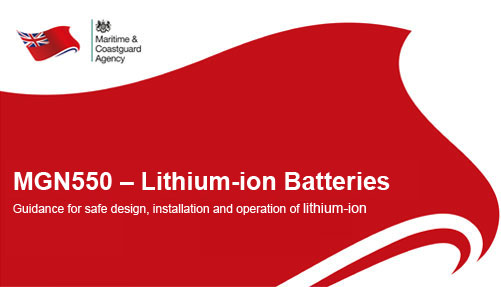MCA MGN550 - Lithium-ion Batteries Guidance

23.09.2024

MCA Marine Guidance Note MGN550 - Amendment 1
Marine Guidance Note 550: 'Electrical Installations - Guidance for Safe Design, Installation and Operation of Lithium-ion Batteries.'
The intent of this MGN is to provide the marine industry with best practice guidance to facilitate safe and environmentally friendly battery solutions for vessels utilising lithium-ion marine batteries as part of an energy source, hybrid power system or as the sole source of propulsion.
MGN 550 was originally published in 2016, with a significantly amended version published in 2024. Topics include Battery System Design, Battery Replacement, Battery Management System, Battery Space and Storage, Ventilation, Cooling Systems, Operation and Handling, Fire Detection, Fire Fighting, Disassembly and Recycling.
The need to reduce emissions is driving battery use within the marine industry. Battery technology is rapidly evolving, enabling the production of more efficient batteries for the use of energy, hybrid and sole propulsion on board vessels. Lithium-ion battery technologies have become a viable energy storage option, due to greatly improved energy density. However, these do not come without risks.
Thermal runaway is one of the main concerns in relation to lithium-ion batteries; where an increase in temperature can cause venting of gases and/or chemicals with corrosive and flammable vapours, cascading from a cellular level through a module, leading to a fire or explosion. Lithium-ion batteries are high-energy devices and should be considered as hazardous, at all times, including during transportation.
Lithium-ion batteries and associated components intended for powering a vessel should comply with a recognised standard meeting the approval of the Administration (see Annex 1 of this MGN). Where lithium-ion batteries are to be used for propulsion, the design and capacity of the electrical energy storage system should be appropriate for the intended operation of the vessel, including capacity for an energy reserve, such as higher power demand in adverse weather or for emergency operations.
Specialist energy training for stakeholders of
vessels that operate on sea, estuaries, rivers and lakes:
NEXT GEN Marine ENERGY Training >

All images are copyright NEXT GEN Marine Ltd 2025 unless otherwise stated.
This does not exclude the owner's assertion of copyright over the material.















